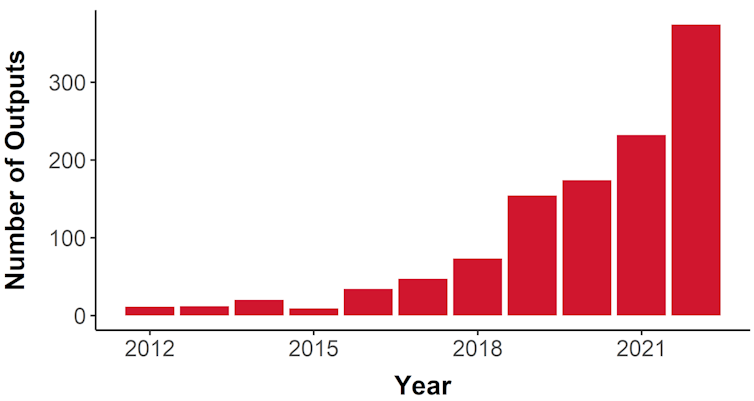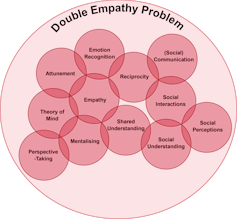How do people successfully interact with those who are completely different from them? And can these differences create social barriers? Social scientists are struggling with these questions because the mental processes underlying social interactions are not well understood.
One recent concept that has become increasingly popular is the “double-empathy problem”. This draws on research looking at people who are known to experience social difficulties, such as autistic people.
The theory proposes that people who have very different identities and communication styles from each other – which is often the case for autistic and non-autistic people – can find it harder to empathise with one another. This two-way difficulty is what they mean by the double-empathy problem.
This idea is getting a lot of attention. Research on the double-empathy problem has rapidly grown over the past decade. This is because it has the potential to explain why different people in society might struggle to empathise with one another, potentially leading to personal and societal problems; from poor mental health to inter-group tensions and systemic racism.
But is this idea accurate? Our recent paper suggests that things might be much more complicated than that.

Our analysis suggests that the double-empathy theory has many shortcomings. It highlights that there is widespread confusion surrounding the very fuzzy concept of double empathy. The research has also narrowly focused on social difficulties in autism without considering other social identity factors that affect empathy between different groups, such as gender.
The theory also fails to incorporate the psychological neuroscience of empathy. Instead, it confuses the concept of empathy – that is, psychologically feeling the emotions that other people are feeling – with similar but different phenomena, such as “mentalising” (understanding what people are thinking from a different perspective).

Because the double-empathy theory is not well developed, most experiments testing it are muddled. Many researchers claim to be studying double empathy when they do not measure empathy. Meanwhile, other studies are being used as evidence of double empathy despite never having set out to test this theory.
Double-empathy research has also heavily relied on subjective reports of people’s experiences (rather than evaluation by experts), which may not tell the whole story.
Read more: The science of 'mind-reading': our new test reveals how well we understand others
Altogether, the analysis of existing research indicates that the central claim of the double-empathy theory is not well supported. That is, being similar in identity to other people does not necessarily mean that you have more empathy for them.
This is an important issue that needs urgent attention. There are already signs that the double-empathy theory is being put into practice, despite lacking evidence. Certain researchers and doctors have started claiming that, because there is a double-empathy problem, healthcare professionals are generally unable to understand their patients with social difficulties. But there is no reliable evidence for this.
Looking ahead, there is a need for more neuroscientific research on social interaction. We expect that brain imaging technologies, such as “hyperscanning” – scanning multiple human brains at the same time – will help shed light on how different people’s brains interact with each other. For example, this technique can be used to test how similarity between people who interact may influence their brain activity.
To make breakthroughs in this area, this technique could be used alongside artificial intelligence. Exploring whether machines can truly empathise with humans by seeing if they accurately interpret our brain waves will be of great interest.
The benefits of diversity
It is thought that people living in more socially diverse places, such as large cities, tend to be more tolerant of those who are different from them than people who live in socially homogeneous places. They ultimately perceive themselves and others as belonging to the same local community despite ethnic and cultural differences and appear to be better at considering the perspective of others.
This suggests that spending time with people who are different to us can perhaps boost our empathy – something that the double-empathy theory does not predict. Ultimately, empathy is not just down to our ability to understand someone through their similarity. Spending time with those from other social and cultural backgrounds may make us place less emphasis on differences – and discover common ground in other areas.
Human experience is vast and complex. Just because two people come from different cultures or have different communication styles does not mean they cannot be very similar in other ways. Perhaps their values align or they have similar interests. This insight could have the potential to remove some barriers that may otherwise make it difficult to understand and empathise with others.
And, sometimes, people from similar backgrounds struggle to understand each other, yet can have great empathy for people who are completely different from them (for example, refugees fleeing war-torn countries). Why? The double-empathy theory may not be the best way to make progress, but it might serve as a springboard for future research to answer this and other questions.
We could really harness the social science of empathy to understand these incredibly complex social issues. This might ultimately reduce societal conflict and improve social cohesion – but we must get research on the right track to achieve this potential.

